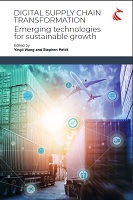Digital Supply Chain Transformation
Emerging Technologies for Sustainable Growth
| dc.contributor.editor | Wang, Yingli | |
| dc.contributor.editor | Pettit, Stephen | |
| dc.date.accessioned | 2024-04-15T14:16:42Z | |
| dc.date.available | 2024-04-15T14:16:42Z | |
| dc.date.issued | 2022 | |
| dc.identifier | OCN: 1430478888 | |
| dc.identifier.uri | https://library.oapen.org/handle/20.500.12657/89840 | |
| dc.description.abstract | Digital and communication technologies, from cloud computing, Internet of Things (IoTs), big data and analytics, to artificial intelligence (AI), robotics and blockchain, are having a profound impact on individuals, organisations and society. The devastation caused by the global Covid-19 pandemic has highlighted the fact that digital transformation is no longer an option but a survival necessity. In the supply chain field, technology developments require companies to rethink the way they design and manage their supply chains, in order to cope with ever-growing customer expectations and to remain competitive in the marketplace. Meanwhile mega-trends and geo-political uncertainties such as Brexit, US-China trade wars and climate change have increased the pressure for supply chains to become more agile, resilient and sustainable. This edited book aims to provide readers with deep insights into how those emerging digital technologies, if deployed effectively, will allow organisations to reach the next level of operational effectiveness, and leverage emerging digital supply chain business models to transform their traditional supply chain into a sustainable digital supply chain ecosystem. The book brings together contributions from world-leading experts in supply chain digitalisation from both academia and industry, analysing cutting-edge developments observed in industries and drawing insights from the latest research in the field, such as EU Horizon 2020 project research. The contributors deliberately shy away from more established technological developments such as supply chain planning and execution systems, cloud computing and electronic platforms/networks. They focus entirely on the latest emerging digitalisation developments instead, bringing readers up to date so that they can appreciate how these are disrupting and will disrupt the status quo of supply chains. The target audiences include academics, students (undergraduates and postgraduates) and practitioners who are interested in supply chain digitalisation and transformation. | en_US |
| dc.language | English | en_US |
| dc.subject.classification | thema EDItEUR::K Economics, Finance, Business and Management::KJ Business and Management | en_US |
| dc.subject.classification | thema EDItEUR::K Economics, Finance, Business and Management::KJ Business and Management::KJM Management and management techniques::KJMV Management of specific areas::KJMV9 Distribution and logistics management | en_US |
| dc.subject.classification | thema EDItEUR::K Economics, Finance, Business and Management::KJ Business and Management::KJM Management and management techniques::KJMN Business process / operations management | en_US |
| dc.subject.classification | thema EDItEUR::T Technology, Engineering, Agriculture, Industrial processes::TB Technology: general issues | en_US |
| dc.subject.other | Digital platform; digital ecosystem; sustainability; Artificial intelligence; Blockchain or distributed ledger technology; Emerging technology; Digital transformation; Supply chain digitalisation or digitisation | en_US |
| dc.title | Digital Supply Chain Transformation | en_US |
| dc.title.alternative | Emerging Technologies for Sustainable Growth | en_US |
| dc.type | book | |
| oapen.identifier.doi | 10.18573/book8 | en_US |
| oapen.relation.isPublishedBy | e4646e28-cefc-40b0-982d-829a1e2a7faa | en_US |
| oapen.relation.isbn | 9781911653349 | en_US |
| oapen.relation.isbn | 9781911653356 | en_US |
| oapen.relation.isbn | 9781911653363 | en_US |
| oapen.pages | 162 | en_US |

